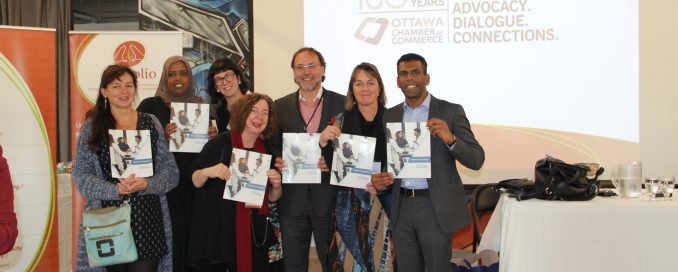Bridging Skills Demand and Immigrants’ Talent
January 10, 2018Highlights from Ottawa Immigration Forum Session – November 20, 2017
About 65 participants attended the Ottawa Immigration Forum session on Employment: Bridging Skills Demand and Immigrants’ Talent, to discuss challenges and opportunities for addressing employment gaps with immigrant talent.
Warren Creates, Head of Immigration Law Group at Perley-Robertson, Hill & McDougall, introduced the Ottawa Chamber of Commerce report Findings on Talent and Immigrants: Ottawa Business Growth Survey, which presents the findings of a survey on Ottawa businesses’ knowledge of and access to immigrant talent. Creates noted that this research is the first of its kind in Canada to examine the importance and current situation of newcomer employment.
The Ottawa Employment Hub’s Ingrid Argyle presented Ottawa This Quarter: Q3 2017, an overview of Ottawa’s current employment situation, as well as recently released census data on Ottawa’s immigrant population. She also provided an overview of OLIP’s priorities related to enhancing immigrant employment and linking immigrant talent with employer demand. Participants also viewed short videos on a range of pathways to employment and entrepreneurship.
Participants identified a number of ways to overcome challenges to immigrant employment and create solutions:
- Draw on partnerships to bring about success in connecting newcomers with employment;
- Focus on bridging, mentoring, and work placements as pathways to employment;
- Provide navigators, for example to federal and provincial public service jobs;
- Remove systemic barriers through credential recognition, affirmative action, revisiting security clearance documentation requirements, etc.;
- Address systemic discrimination and racism – for example, through diversity audits, and use of anonymous resumes;
- Examine areas of high demand, e.g. for IT professionals and personal support workers;
- Consider innovations such as guaranteed basic income to provide people with the opportunity to transition to employment in their fields over time;
- Support employers’ awareness of immigrant skills and of services that can connect them to immigrant talent.


 Canada has been shaped by people who came from all over the world to build this country. WOW offers a platform for us to celebrate this history and the future it will help…
Canada has been shaped by people who came from all over the world to build this country. WOW offers a platform for us to celebrate this history and the future it will help…
